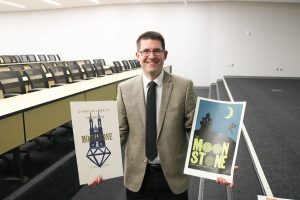As the semester comes to a close, an interactive online book club course at the University of Indianapolis held its last lecture. On Nov. 26, the final event for Communiversity: Moonstone was about justification and justice in the book that they read, “The Moonstone” by Wilkie Collins. This year, Professor of English and co-creator of the course Jennifer Camden decided to change the style of the physical part of the class. There have also been four events in the past, which Camden orchestrated alongside the theater and music departments or other organizations on campus, Camden said. This year she wanted to have speakers come in from on or off campus, give a 30-40 minute lecture and have a discussions with the attendees after.
Chair and Associate Professor of Philosophy and Religion Jonathan Evans spoke about the philosophy and behind the book “The Moonstone” by Wilkie Collins. Evans based his lecture on belief systems of people and why each person has a different set of values and connected this idea to the theme of the novel read for the course.
“From the course, this sort of started with what I saw as a disconnect. Out in the real world, people outside of the university, people love having book clubs. Libraries have them, book stores have them, groups of friends get together to have them,” Camden said. “I wanted to bring that same fun aspect of reading into the classroom. Often, being assigned a book can kill the fun of reading for some students and I thought that was a real shame. So I was trying to think of what would be the sources of the death of that joy and how we could bring it back [the joy].”
In the past years, book selections included “Emma” by Jane Austen and “Frankenstein” by Mary Shelley. All of the books from previous years were chosen by Camden because they had some sort of significance when they were released, but this years’ book was a risk to her because it was not as well known, she said.
Students or community members are able to attend the meetings that are held during the first semester. The oldest recurring face is Camden’s 88-year-old neighbor, who is also an alumni of the university. He was an English major back in the 1950s, Camden said. She thinks the students enjoy having someone to take their ideas seriously and listen to what they have to say.
“I wanted to bring the same fun aspect of reading into the classroom .”
In terms of actually being a book club, the in-person meetings are not necessarily what makes it feel like a club, according to sophomore finance and supply chain management double major Isaac Bush. Bush said that the part he feels coordinates to that group feeling is the weekly discussion board, in the online portion of the class, that they have to participate in.
“The book club vibe comes more through the actual course and the forum posts we have every week, so we can respond to each other and see what we have to say,” Bush said.
“The Moonstone” is a mystery novel that laid out the basic plot for other murder mystery novels, Camden said. It has the original layout of an English country house, a thief, a butler who knows too much information and a grizzled police sergeant looking into the crime. There are lots of things to take in consideration when picking speakers, but Camden said she wanted to focus on the aspect of the ethical questions that come up about telling the truth about the crime with each character so she brought in someone who has been able to help her in the past in that discipline.
The lecturer for the last session was Department Chair for Philosophy and Religion Jonathan Evans. He said the struggle that he went through when constructing his presentation was translating the same ideas from his original writing outline over to the physical presentation. Evans said that appealing to both the audience who was aware of the book’s contents and the general public, the presentation warranted good discussion after the lecture was done.
“It was really a matter of thinking what might be an accessible issue for a broad audience. That also taps into something that is unique to philosophy so this idea of evidence and justification and justice in how they all interact, seemed like it would be a good fit, [and] wouldn’t have to get super complicated, which as you might guess, with philosophy and any other discipline that can be pretty easy to do,” Evans said. “So I think having such an accessible text with really interesting issues could have gone a lot of different ways, but since it was a mystery novels, it seemed to make a lot of sense and talk about evidence, mystery and investigations and justice.”
This course is offered each fall semester and any student or community member can participate in the events or join the course.







